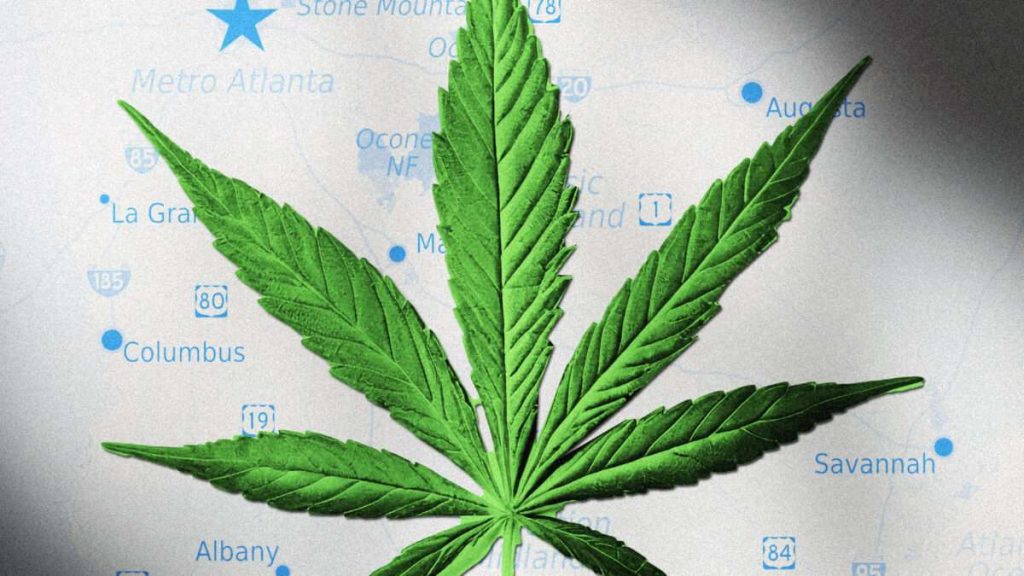In 2022, Reason reported that local police departments in Georgia were hassling vape and smoke shops for the legal products they sold. Two years later, those products remain every bit as legal as before, but cops are still making life difficult for vendors.
On March 13, officers with the Newnan Police Department Drug and Vice Unit raided Newnan Tobacco & Vapor. According to The Newnan Times-Herald, officers said the raid came after “compliance checks with local stores that sell Delta 8, 9 or THC products.”
Delta-9 tetrahydrocannabinol (THC) is the psychoactive ingredient in cannabis, which creates the “high” from using marijuana. Ever since the 2018 Farm Bill removed hemp from the list of controlled substances, federal law limits the amount of delta-9 in any substance to 0.3 percent.
But around the same time the Farm Bill became law, scientists discovered delta-8 THC, which produces a similar “high” as delta-9 but can be synthesized out of CBD derived from hemp. (A similar process produces a similar compound, delta-10 THC.) Since the Farm Bill specifically legalized the sale and production of hemp, it was assumed that any hemp byproducts were legitimate, as well—and in 2022, the U.S. Court of Appeals for the 9th Circuit agreed.
Georgia passed a similar law in 2019, which legalized hemp in the state, as well as “all derivatives, extracts, cannabinoids, isomers, acids, salts, and salts of isomers, whether growing or not, with the federally defined THC level for hemp or a lower level.”
And yet police departments hassle smoke shops over their perfectly legal products.
In January 2022, District Attorney Patsy Austin-Gatson of Gwinnett County, which includes part of Atlanta, announced that her office would crack down on stores selling delta-8 and delta-10 products. She justified this action on the theory that since state law mentions delta-9 but not delta-8 or delta-10, then those must not be allowed in any capacity. “Those found to be possessing, selling or distributing these substances may be subject to felony punishment and are at risk of having their assets seized and forfeited to the state,” Austin-Gatson’s office said in a statement.
Two Gwinnett smoke shops sued Austin-Gatson and the state of Georgia after being raided. In April 2022, Judge Charles Eaton Jr. of the Fulton County Superior Court issued an injunction barring Austin-Gatson from prosecuting anyone for selling delta-8 or delta-10. The previous month, a judge had ordered the Madison County Sheriff’s Office to return delta-8 products improperly seized during a raid.
In March 2023, the Georgia Supreme Court dismissed the Gwinnett shops’ lawsuit and lifted the injunction against Austin-Gatson, finding that “the doctrine of sovereign immunity, as enshrined in our Constitution, bars suits against the State and its employees in their official capacities.”
Then in November, the Georgia Court of Appeals ruled in the shops’ favor, with Presiding Judge Christopher McFadden writing, “The state’s argument has no merit,” as the seized products “do not contain any controlled substances; they are alleged to contain only delta-8-THC or delta-10-THC, which the state concedes are not controlled substances.”
So why, then, did cops in Newnan raid a smoke shop five months after that decision was issued?
“That was an unpublished opinion, because all the judges agreed on the outcome, but they didn’t all agree on the same reasons,” says Tom Church, an attorney who represents multiple smoke shops in the state, including the plaintiffs in the Gwinnett case as well as Newnan Tobacco & Vapor. “They all agreed we should have gotten back our money and our gummies, and all the other property that was seized, but they didn’t all agree on the same reason.”
Indeed, while McFadden wrote the appeals court decision, the filing notes that the other two judges “concur[red] in judgment only.” In many judicial districts, unpublished opinions “cannot be cited as binding precedent” but instead “are merely persuasive authority,” according to the Georgetown University Law Center.
In practice, this means that police can still arrest shop owners and seize their cash and inventory for selling products with delta-8 and delta-10, even though multiple laws and judicial decisions have said the products are legal and no law or decision has said the opposite.
“We have all the authority on our side,” Church says. “These local law enforcement officials just keep getting it wrong, unfortunately.”
The post Georgia Cops Are Still Hassling Vape Stores Over Legal Products appeared first on Reason.com.







